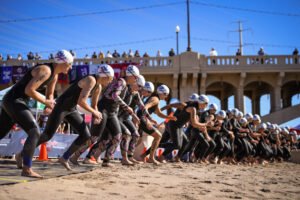Triathlon, a demanding multi-sport competition that includes swimming, cycling, and running, continues to grow in popularity in the United States. With this growth comes the need for a structured ranking system that not only helps athletes track their performance but also allows them to set competitive goals and measure progress against their peers. USA Triathlon (USAT), the national governing body for the sport, has developed a comprehensive ranking system designed to do just that. Here’s a closer look at how USA Triathlon rankings work, why they matter, and how athletes can use them to enhance their training and competitive edge.
Table of Contents
ToggleWhat Are USA Triathlon Rankings?

USA Triathlon rankings are a point-based system used to evaluate and compare athletes across various divisions and age groups. These rankings help athletes understand where they stand on a national scale and provide a pathway to qualify for regional and national championships. Each athlete earns points based on their performance in sanctioned triathlon events, and those points are used to create rankings across different categories.
The rankings are broken down by age, gender, and division, including:
– Youth (up to 17 years old)
– Age Group (18 and older, categorized in 5-year increments)
– Elite (professional triathletes)
– Paratriathlon (athletes with physical disabilities)
USA Triathlon also includes rankings for specific race types, such as Sprint, Olympic, Half-Ironman, and Ironman distances, as well as Duathlon and Aquathlon events.
How Are Rankings Calculated?
Each athlete’s ranking score is determined by their performance in USAT-sanctioned events. Scores are calculated using a formula that factors in:
- Finishing time relative to the overall winner’s time
- Event difficulty and course conditions
- Competition level based on the number of high-ranking athletes present
The basic formula is designed to normalize scores across various events, so athletes can compete and earn points consistently, whether they race in a small, local event or a highly competitive national race.
To be eligible for an official USAT ranking, athletes must complete a minimum number of sanctioned events in a given season, typically around three to five. Once an athlete’s scores are calculated, they are averaged to generate an overall ranking for that season. This ranking can help determine eligibility for high-level competitions, including the National Championships and potentially even Team USA qualification.
Why Do USA Triathlon Rankings Matter?
For athletes, USA Triathlon rankings provide a sense of achievement and progression. They offer a way to measure improvement year-over-year and create an incentive to participate in a variety of events across the country. Rankings also have several practical implications, including:
Qualification for Competitions: Higher rankings may qualify athletes for exclusive competitions, including age-group nationals, regional championships, and the prestigious Ironman events.
Recognition: Athletes who rank highly in their division often receive recognition from the USAT and their local triathlon communities, enhancing their profiles and, potentially, gaining sponsorship interest.
Motivation and Goal Setting: Rankings can serve as powerful motivators, helping athletes set realistic, tiered goals and train more purposefully to reach them.
For those who have recently taken up triathlon, the ranking system also provides a structured pathway for progressing from beginner events to more competitive arenas. Achieving a ranking within the top tier of an age group is a common goal for triathletes, inspiring them to push their limits and grow their skills.
How Can Athletes Improve Their Rankings?

Improving one’s USA Triathlon ranking requires a combination of strategic race selection, disciplined training, and consistent performance. Here are some tips:
Choose the Right Races: Participating in sanctioned events with higher competition levels can lead to better ranking points. Athletes should aim to race in events where they’re likely to perform well but are also sufficiently challenging.
Focus on Consistency: High rankings often favor athletes who consistently perform well across multiple events. Rather than focusing on a single big race, aim to race consistently throughout the season.
Improve Race-Specific Skills: For triathletes, enhancing swimming, cycling, and running skills individually is key to improving overall performance. Athletes should consider working with coaches, joining training groups, or taking part in specific training camps.
Track Progress and Adjust Goals: Setting intermediate goals within a season and adjusting training to target weak spots can yield incremental improvements in ranking performance.
Staying Updated with USA Triathlon Rankings
USA Triathlon updates rankings on a regular basis, allowing athletes to monitor changes and keep track of their standing. Athletes can access their scores and rankings by logging into their USAT accounts, where they’ll find detailed information about points from each race, total score, and how they compare to others in their category.
The USAT website also features tools for filtering rankings by region, age, and race distance, helping athletes find relevant data to shape their competitive strategy.
The Future of USA Triathlon Rankings

The USA Triathlon ranking system has continually evolved, and further enhancements are likely as technology advances. Innovations such as real-time race tracking, data analytics in training, and increased event coverage have the potential to make rankings more dynamic and responsive. As the sport grows, we can expect even more emphasis on the accessibility and transparency of the ranking system, allowing triathletes of all levels to engage in meaningful competition and set clear goals.
Final Thoughts
USA Triathlon rankings are more than just a leaderboard; they’re a tool for personal development, community building, and competitive motivation. Whether you’re an elite athlete or an age-grouper, understanding and engaging with the ranking system can open doors to new challenges and achievements within the sport. So, lace up, dive in, and pedal hard – with each race, you’re not just competing but climbing the ranks in the vibrant and growing world of American triathlon.
FAQs about USA Triathlon Rankings
What are USA Triathlon Rankings?
USA Triathlon Rankings are a points-based system that evaluates athletes’ performances in sanctioned triathlon events.
How are USA Triathlon Rankings calculated?
USA Triathlon Rankings are calculated based on factors like an athlete’s finishing time, event difficulty, and competition level.
Why do USA Triathlon Rankings matter?
USA Triathlon Rankings matter because they help athletes track progress, qualify for championships, and set performance goals.
How can athletes improve their USA Triathlon Rankings?
Athletes can improve their USA Triathlon Rankings by participating in high-competition events, racing consistently, and enhancing their skills.
Where can athletes check their USA Triathlon Rankings?
Athletes can view their USA Triathlon Rankings by logging into their USA Triathlon account online.
Can USA Triathlon Rankings change throughout the season?
Yes, USA Triathlon Rankings update regularly, so athletes’ standings can shift based on ongoing performances.

